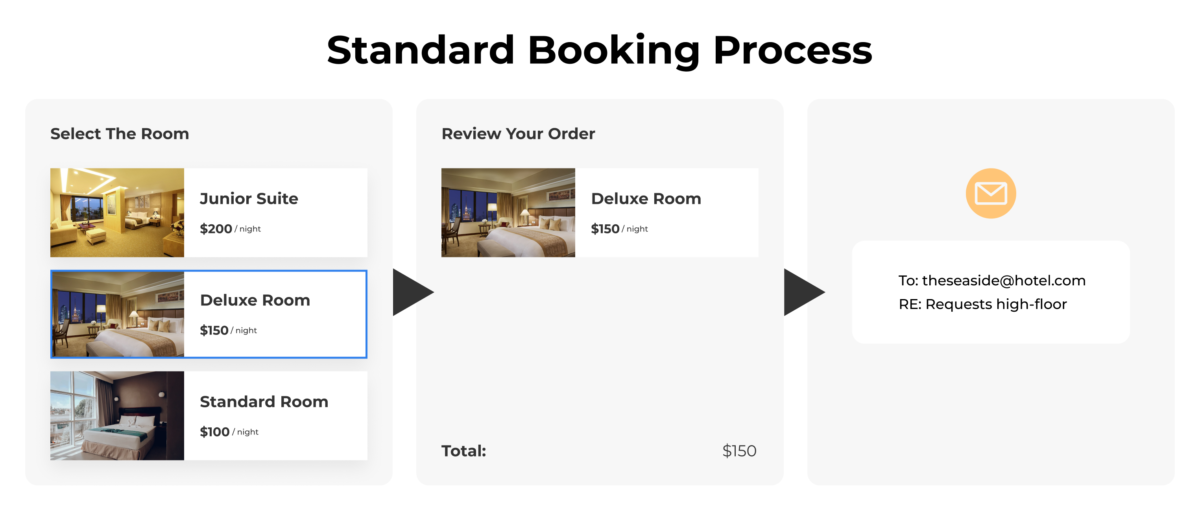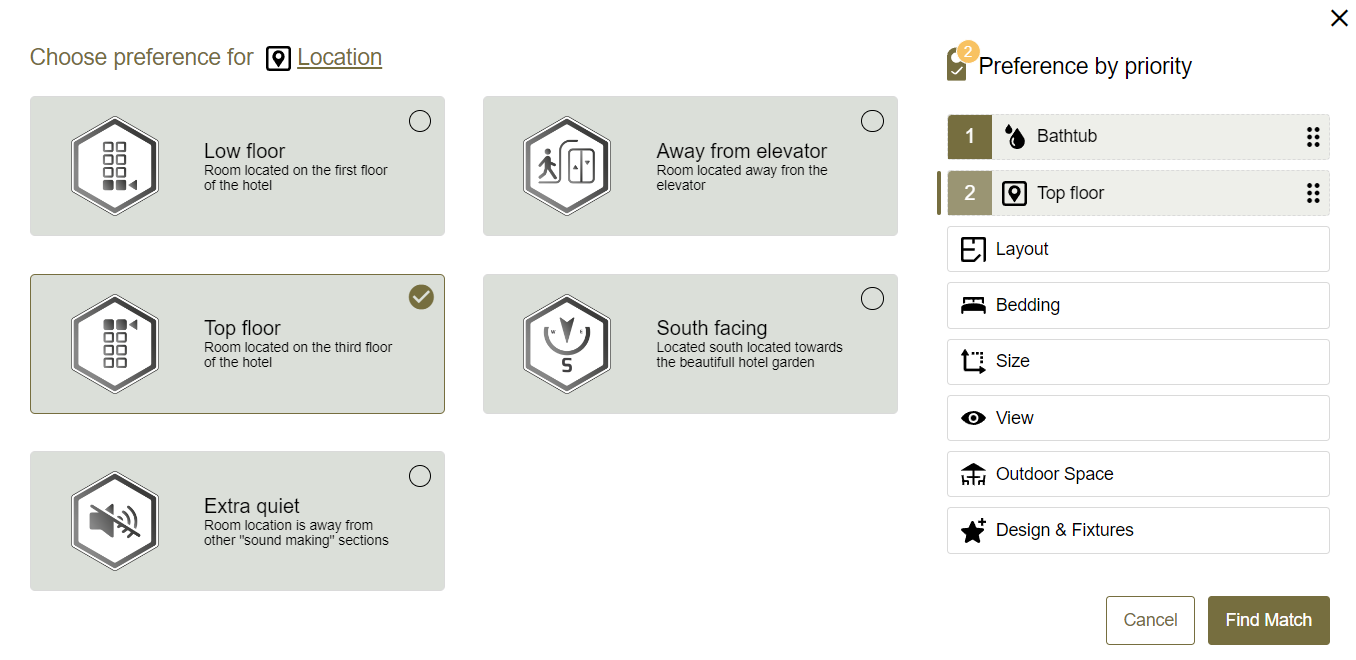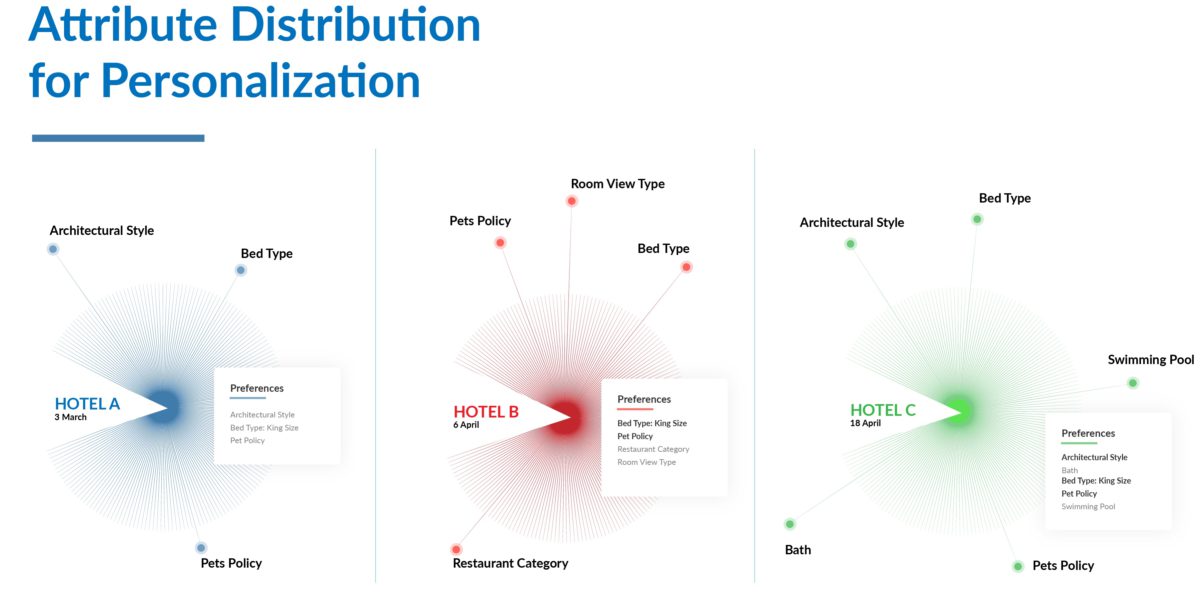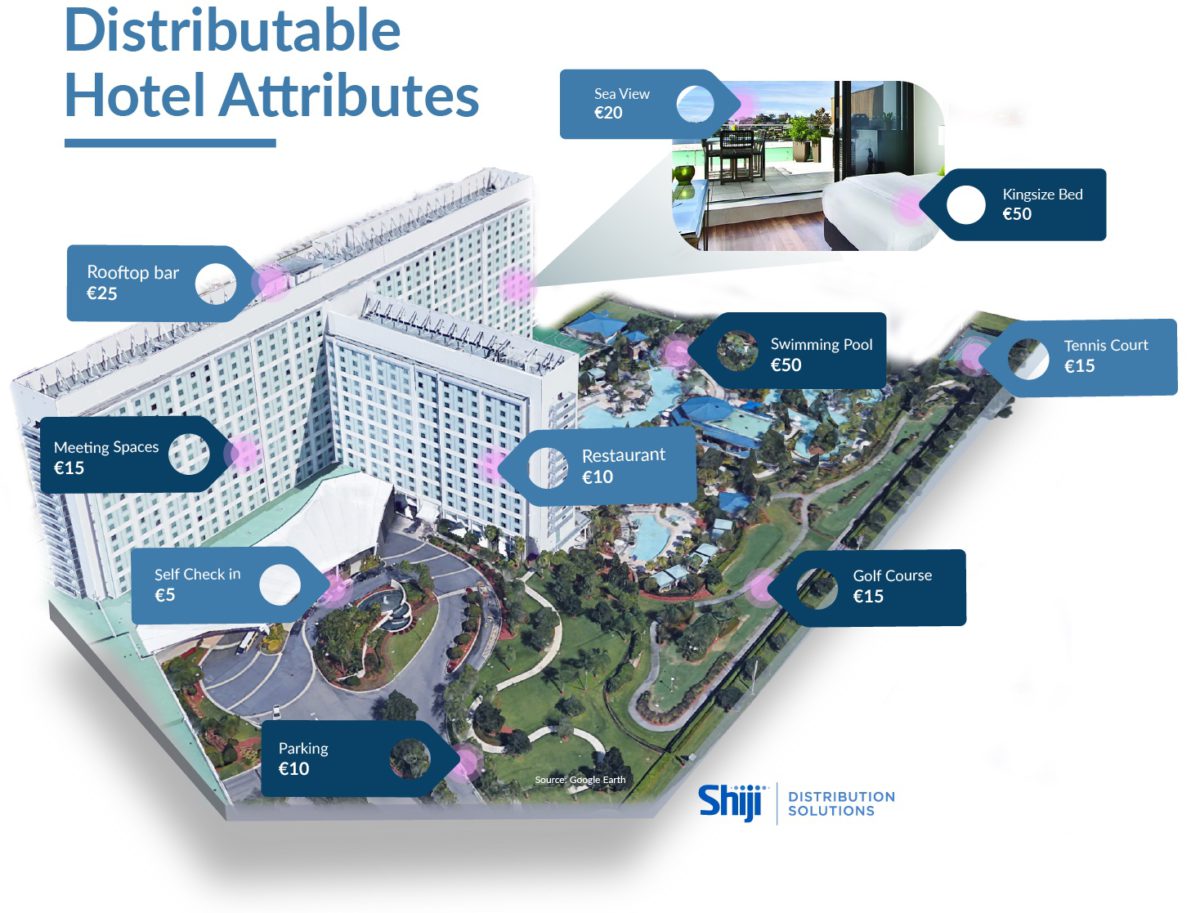Attribute-based Selling is a term that concept of it has been brought up in casual conversations, discussed at conferences, and engaged in serious debate. It is something that you may less think of, however, has experienced before since it has been widely utilized in the airline sector when they begin to let us choose extras like seats with more legroom, better food, or faster boarding. Many experts have been talking about Attribute-based Selling in the hospitality industry for years, but businesses are still reluctant to integrate it into their hotel and room booking systems.
What is Attribute-based Selling and how does it function? Why should you consider this approach to your hotel business? What’s more, is it worth the time and money invested?
In this article, we will discuss the mentioned questions and share thoughts about whether this term will open a new future or set up different standards for the hospitality industry.
What exactly is Attribute-based Selling (ABS)?
The definition of Attribute-based Selling (short writing: ABS) includes breaking down the products into separate features and services. As a hotelier, you can take a similar approach to how ABS is implemented in the airline industry when selling your room. Instead of providing guests with a variety of room categories to select from, you can provide them with the chance to customize the perfect room by beginning with a basic room type and then adding on room amenities at various price points.
Rather than paying for things they don’t want to pay for, guests may, for instance, select a basic room without breakfast for €50, add a king-size bed for €50, and a sea view for €20.
How Attribute-Based Selling works for hotels
Standard Room Booking
Under a standard room booking model, guests would typically choose their vacation destination and the length of their stay, then visit a booking website or call the hotel to make a reservation. Normally, there are three different room types: Standard, Deluxe, and Junior. And the cost will vary according to the kind of room.
The guests choose the Deluxe Room in the following picture because it contains a bathtub. Other details like breakfast, Wi-Fi, parking, and the kind of view that this Deluxe Room has are not mentioned. The Deluxe Room at this hotel might come with a balcony, an extra desk for work, an ocean view of the beach, a free breakfast, a free cancellation, or a sizable quantity of space, yet the guest has no control over this. These attributes are included in the accommodation charge but are not necessities for our guests.
What if our guests desire a higher floor but the available Deluxe Room does not offer that attribute in this situation? The guest would need to contact the reservations service via phone or email and request another Deluxe Room on a high floor. Even so, it wouldn’t guarantee them a room on a high floor.

Attribute-based Room Booking
Implementing ABS into your hotel booking model also means giving your guests the ability to look through qualities that are both necessary for their stay and nice-to-haves, and customizing their experience based on the situation and/or their preferences. Moreover, because of the complete display of features that are available in each room, guests can now select the room that best matches their needs. This help avoids the scenario where guests arrive and the room they are given is different from the room they imagined.
In the same situation mentioned above, the guest can now choose a room that contains “top floor” and “bathtub” as preferred or required attributes. Other attributes in the room such as a queen bed, double bedroom, village view, and daily servicing, are all very clearly displayed so that guests can simply visualize what features the room they will book comes with.

Is ABS the new future of the Hospitality Industry?
Offering guests what better matches their individual needs
“Everything has to evolve or else it perishes.” – John Knowles (2014). “A Separate Peace”, p.99, Simon and Schuster
Based on the recent Skift article, 85% of participants in a study on hoteliers’ booking methods said they consider the traditional method of booking hotel rooms to be “uncertain”, travelers prefer a personalized booking process. The hotel of the future must be prepared to meet evolving guest expectations. Because Attribute-based Selling gives guests more control over what they book and pay for, this pick-and-mix strategy may revolutionize the booking process as well as increase the satisfaction of guests. An attribute-based booking would dramatically affect the guest’s booking procedure because guests decide what they would eventually pay for. The ability to select their favorite amenities at the beginning of the booking process also makes it much simpler for guests to customize their hotel stay.

Hotel operators will love it
ABS may come as an operational challenge at first but with just the right technology and engine, it can become an effective tool for hotel operators. Bid adieu to the outdated booking and inventory management model and welcome a brand-new approach to simplifying hotel management. By automating room assignments, you can give your guests the greatest possible experience while decreasing the number of guests who ask to switch rooms or complain when their room isn’t what they expected. Moreover, contextual trip data can also assist you in having meaningful guest conversations during check-in.
Opportunity to maximize revenue
Even though the hotel business is a late adopter of Attribute-based Selling, it is undeniable that this idea will have a favorable effect on inventory and revenue.
In the normal hotel managing model, rooms aren’t managed to take advantage of the changing demand. Because people have not purchased or preferred any amenities associated with that room, but are still occupying it, the maximum value of those assets will be forfeited for the night of the occupied room. There are a lot of room features and attributes that are diluted because they are not managed. With the right technology, they can be dynamically priced based on demand, the price of a standard room can go up to the price of a higher room type.
As a result, the importance of room type is diminished, and hotels are prevented from overbooking specific categories. Guests are now able to get exactly what they want and are happy to pay a premium for it, which in turn, increases the hotel’s revenue.
With this transition, we saw the emergence of ultra-low-cost carriers, who became champions at unbundling air travel services. In 2019 alone, airlines profited $110 billion globally from add-on revenue.

Getting ahead of the competition
Hotels have always recognized the value of attributes, and some are good at providing such to visitors who specifically ask for them. However, not many actually “sell” them. Now you know the benefits of Attribute-based Selling but beginning to implement it in your hotel inventory management model and booking system is never as easy as saying.
This is also more feasible than before with businesses like Shiji Group, Amadeus, GauVendi, and ROOMDEX cracking the code on ABS. Due to the benefits that ABS comes to offer, boutique hotels, small chains, and major hotel chains are slowly adopting it. For instance, Hilton has introduced a new booking experience that allows individuals to easily reserve and instantly confirm at least two connecting rooms and IHG is currently working with Amadeus to implement a new guest reservation system.
Hotel owners have the chance to rethink the ways of using their facilities and increase revenue from in-room amenities while maintaining the personalization capabilities that customers have grown to expect. The moment has come for attribute-based selling as a concept. Now is the time to start considering how this term can be used and making future plans when the majority of hotels still wait for it to grow. The revenue will be first taken in by the early adopters.
Closing Thoughts
It allows guests to personalize their hotel stay, increases hotel revenue, and improves the booking process in general. Although there may be obstacles along the road, we think Attribute-based Selling is the next natural step for hotel businesses and its long-term benefits will be priceless.